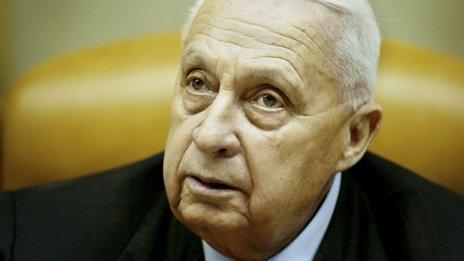Profile: Ariel Sharon
- Published

Ariel Sharon's decades of military and political leadership made him one of Israel's most formidable and controversial figures.
His actions on the battlefield and later on in the political arena helped shape the modern state, but also often polarised opinion.
Perhaps more than any other Israeli leader, Mr Sharon was admired and reviled in equal measure.
His paramount aim in life was to ensure total security for Israel on his terms, even at a political cost.
Mr Sharon was long-time champion of Jewish settlements in the occupied territories, but one of his final acts - pulling Israel out of Gaza - caused shockwaves among many of his supporters. Shortly afterwards his career was abruptly ended when he suffered a succession of strokes, leaving him in a coma.
Tough commander
Mr Sharon was born in Palestine in 1928, when it was under British mandate.
As a young man he joined the Jewish underground military organisation Haganah, and fought as a platoon commander in the Arab-Israeli war of 1948-49.
In the 1950s he led a team of special forces, called Unit 101, in reprisal raids for cross-border attacks by Palestinian militias.
Mr Sharon fought in all of Israel's wars since the state's founding in 1948, and earned a reputation as a fearless soldier and brilliant strategist.
He led a paratroopers' brigade in the 1956 Suez War and rose to the rank of major general. In the war of June 1967, Mr Sharon commanded a division in the Sinai where his success against the Egyptian army played a key part in Israel's capture of the entire peninsula.
Six years later, when Egypt and Syria launched a surprise attack on Israel, Mr Sharon led a division which cut off Egypt's Third Army in the Sinai, a move which turned the tide of the war and helped Israel win.
Mr Sharon was elected to the Israeli parliament (Knesset) as an MP of the new right-wing Likud party two months later, but resigned the following year to serve as a security adviser to Yitzhak Rabin.
He was re-elected to the Knesset in 1977 and was appointed minister of defence in Menachem Begin's government in 1981.
In the wake of shelling of northern Israel by Yasser Arafat's Palestine Liberation Organisation (PLO) in southern Lebanon, Mr Sharon masterminded Israel's invasion of its northern neighbour in 1982.
Without explicitly informing Prime Minister Begin, he sent the Israeli army all the way to Beirut, a strike which ended in the expulsion of the PLO from Lebanon.
The move stopped the PLO using Lebanon to launch attacks against Israel, but also resulted in the killing of hundreds of Palestinians by Lebanese Christian militiamen in two Beirut refugee camps under Israeli control.
The incidents, known as the Sabra and Shatila massacres, made Mr Sharon notorious among Palestinians, and hated.
Mr Sharon was removed from office in 1983 by an Israeli tribunal investigating the 1982 Lebanon invasion, finding him indirectly responsible for the killings.
Political comeback
Mr Sharon however remained a popular figure among the Israeli right and continued to hold key posts in successive governments.
He was a staunch supporter of Israeli settlers, and as housing minister in the early 1990s, he presided over the biggest building drive in Jewish settlements in the West Bank and Gaza since Israel occupied the territories in 1967.
After Benjamin Netanyahu's right-wing coalition came to power in 1996, the new Israeli prime minister brought him into his cabinet.
On appointing him as foreign minister in 1998, Mr Netanyahu said Mr Sharon was the best man for the job.
"We shouldn't deal with bygones," he said. "He has a record throughout his public life and during the past 15 years that people should be proud of."
Mr Sharon went on to become leader of the Likud Party in opposition after Mr Netanyahu's defeat in the 1999 general election.
After the failure of the 2000 Camp David talks, Mr Sharon sought to stir a public groundswell against the then Prime Minister Ehud Barak, depicting him as a usurper ready to trade Jerusalem for a peace agreement.
''Barak does not have the right to give up Jerusalem, which the people received as a legacy,'' Mr Sharon said at a parliamentary session.
New times, new party
In 2000 Mr Sharon paid a controversial visit to the holy compound in Jerusalem known as the Temple Mount to Jews and Haram al-Sharif to Muslims.
Palestinians rioted and the second intifada (uprising) ensued.
In February 2001 Mr Sharon won a landslide victory, pledging to achieve "security and true peace" while insisting he would not be bound by previous negotiations with the Palestinians.
Following a spate of suicide bombings and attacks by Palestinian militants in Israel in the 1990s and beyond, Mr Sharon sought to fortify the state by building the controversial West Bank barrier.
However, he went on to withdraw from Gaza and four settlements in the northern West Bank in the face of great hostility at home, but ruled out any further unilateral withdrawals.
Amid growing dissent within Likud over the Gaza pull-out, Ariel Sharon left the party in November 2005 along with many allies to form Kadima and dissolved parliament.
Kadima was seen by some largely as a vehicle for Mr Sharon, bringing together disparate politicians under the unifying influence of the veteran leader.
Mr Sharon looked set to be returned as prime minister in fresh elections, but in December 2005 he was incapacitated by his first stroke, from which he never recovered.